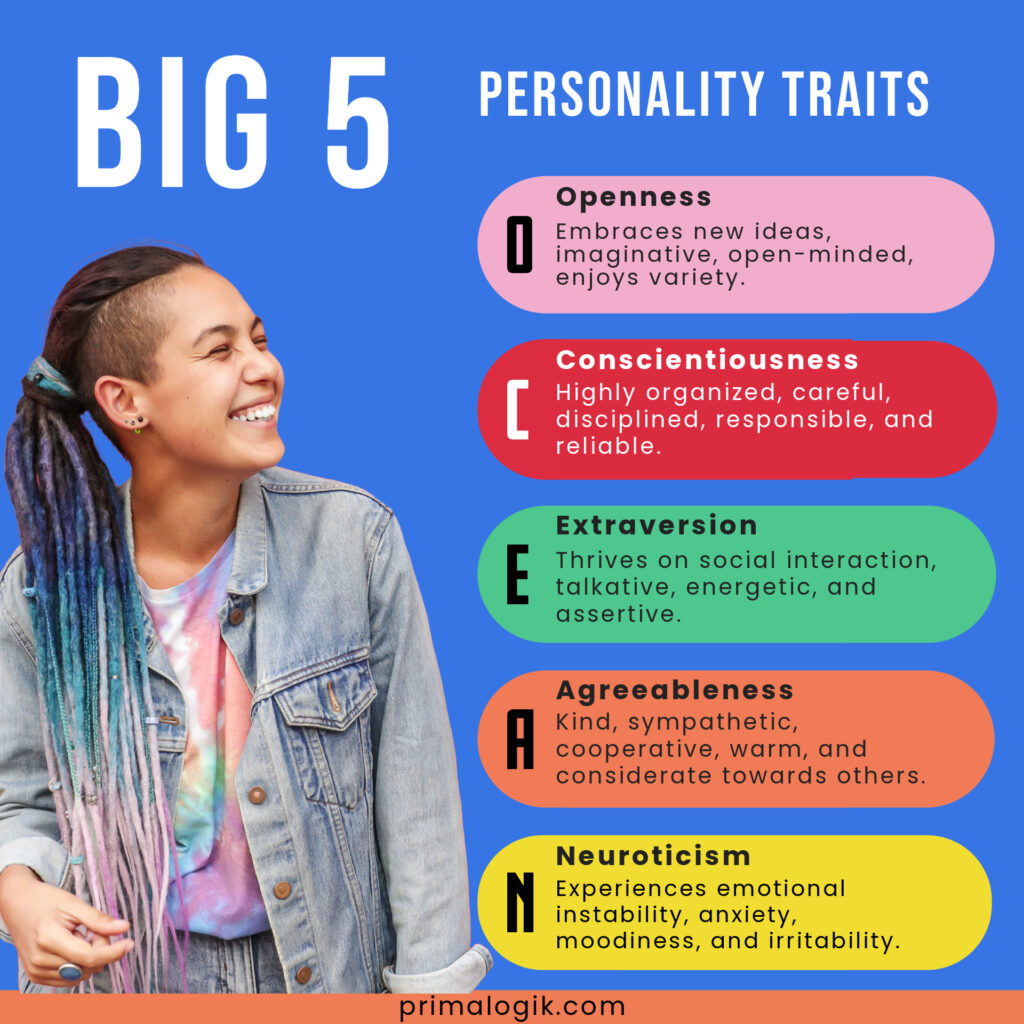Effectiveness in management requires understanding each team member’s motivations, learning style, and personality. In this post, we’ll explore a highly beneficial framework for conceptualizing personality: the Big Five personality traits, also called the Five Factor Model of Personality, which was developed in the 1980s.
The Big Five traits shape interpersonal dynamics in the workplace, influencing how people interact and work together. We’ll discuss what each of these traits entails and how they affect the success of leaders, employees, and teams. Read on as we explore how the Big Five traits influence interpersonal dynamics, work environment, and performance—and how to create teams with a balanced mix of personality types.
Table of Contents
1. Overview of the Big Five Personality Traits
2. Personality Diversity in Teams
Overview of the Big Five Personality Traits

Let’s briefly review each of the Big Five traits, often referred to with the acronym OCEAN. Then, we’ll delve into how they affect performance in more depth. Each of these Big Five traits exists on a spectrum; each person on a team will have a distinct mix of these qualities.
- Openness pertains to curiosity about new things and experiences, along with capacity for imaginative thinking.
- Conscientiousness relates to how disciplined and goal-oriented people are.
- Extraversion involves how outgoing people are (vs. being more introverted).
- Agreeableness deals with how people relate to others—particularly how cooperative and empathetic they tend to be.
- Neuroticism relates to the tendency to worry and become stressed.
Researchers have demonstrated strong relationships between personality types and job performance. Across most job types, high conscientiousness and low neuroticism boost success, say Weixi Kang and coauthors in the journal Frontiers in Psychology. The other three traits have impacts that depend on job context, they note.
Personality traits can even relate to job satisfaction, research has found. Conscientiousness and agreeableness tend to promote job satisfaction, while neuroticism causes it to decline. By enhancing achievement and social relationships, the latter two traits make work more fulfilling, while neuroticism increases stress levels.
Let’s now discuss each of the Big Five traits in more detail.

Openness in the Workplace
Openness involves being receptive to new experiences, using creative thinking to devise novel solutions, and preferring variety rather than a set routine. This quality tends to greatly benefit entrepreneurs, say Kang et al. Being an entrepreneur brings constantly shifting challenges, requiring openness to new opportunities, ideas, and experiences. As business environments become more agile, leaders and managers may increasingly benefit from having a high level of openness as well. Openness may help them prioritize innovation, adapt to changes, recognize valuable opportunities, and seize the moment.
Likewise, openness benefits employees by enhancing their ability to innovate and problem-solve. Further, when teams have a high level of openness, they’ll respond more positively to change rather than resisting it.
Meanwhile, people with a lower level of openness prefer set routines and may feel anxious about change. This preference for routines can prove more beneficial in some roles than others.
Conscientiousness and Work Performance
Conscientiousness involves one’s level of self-discipline and tendency to exceed expectations. It strongly relates to desire to achieve, as Kang et al. explain. People with a high level of conscientiousness thrive on organization, planning, and attention to detail. They’re highly self-directed. These qualities make such employees and leaders reliable. When they set out to complete a task or achieve an objective, they’ll typically meet their targets on time and according to the standards set.
In turn, this dependability enhances team performance and builds trust. Conscientious leaders become trusted mentors who adhere to their word, and conscientious employees earn a strong reputation as high-achievers, which leads them to advance.
Meanwhile, those who are less conscientious tend to be more impulsive, procrastinate, or lack focus. Due to their lower level of self-direction, they typically need a higher level of guidance.
Extraversion and Social Dynamics
Extraversion plays a crucial role in success for anyone working on a team. This quality involves a person’s level of social energy, gregariousness, and assertiveness. To effectively lead people, managers and directors will benefit from a high level of this quality. Those with a high level of extraversion will present themselves with more energy and enthusiasm, while effectively nurturing relationships and providing daily guidance. And on a team, people with high extraversion ensure a steady flow of communication and enthusiasm. As they enjoy working with others, such employees can cultivate a positive workplace atmosphere.
At the same time, introverts have much to contribute to their teams as well. Many introverts enjoy cultivating close relationships with team members, direct reports, or clients. While they may not prefer to make high-powered sales pitches every day, they may enjoy an hour-long collaborative session with teammates. They could have more social energy in certain spaces or times, while preferring to work independently for large portions of the day. Whether they thrive in a particular environment often depends on factors like the level of social interaction required and how much of it involves talking with new people.
Agreeableness and Workplace Cooperation
Agreeableness leads people to be kind and thoughtful toward others. Collaboration, conflict resolution, relationship-building, and overall workplace dynamics all benefit from this quality. Among leaders and those working with customers, agreeableness plays an especially essential role in success. However, it must be tempered with the willingness to make hard choices when need be, note Kang et al. Attempting to please everyone at all times will not bring a leader or manager to success.
On teams, people must be willing to disagree respectfully as well; agreeableness doesn’t mean smiling and nodding when one disagrees with an idea. Rather, agreeableness entails a desire to cooperate, and a sense of good will toward others, that helps teams effectively cooperate.
One study found agreeableness to be the most important of the Big Five traits for job success and career advancement. “Agreeableness is the personality trait primarily concerned with helping people and building positive relationships,” says Michael Wilmot, one of the authors. By fostering qualities like concern for others and relationship investment, they found, agreeableness promotes a harmonious atmosphere along with individual success. For example, an agreeable person can listen to others’ points of view without getting defensive, leading to a productive dialogue, explains Bryan Robinson in Forbes. Such people have high levels of empathy, a core component of emotional intelligence.
Meanwhile, those with low agreeableness may hamper cooperation or have difficulty resolving conflict. Lacking a high degree of empathy, they may frequently make disparaging remarks or lose patience with others.
Neuroticism and Workplace Stress
Neuroticism is a measure of the level of anxiety and pessimism a person experiences at work. People with high levels of neuroticism may experience frequent “moodiness,” easily growing fearful or angry. They may often feel insecure and focused on what others think about them. This trait strongly contributes to workplace stress and decreased job satisfaction.
A low level of neuroticism indicates emotional stability, Kang et al. assert. This is especially critical for managers, whose emotional stability will shape the team’s approach to challenges and conflict. Such leaders and employees remain calm even when encountering hurdles, approaching problems in a logical and strategic manner. A low level of neuroticism can also make a person more optimistic, improving their confidence in their ability to achieve goals.
How can leaders manage employees with high levels of neuroticism? Discussing coping mechanisms with them will help. Stress can’t be avoided completely, but using certain techniques can reduce it, like mindfulness practices or talk therapy. Leaders can connect employees with mental health resources that support such needs. They can also work to build up employees’ confidence in their ability to handle challenges by presenting them with increasingly more difficult tasks, sharing real-time feedback on their performance, and praising them for their achievements.
Personality Diversity in Teams

Having a diverse range of personality types within teams can enhance the ideas they generate, along with their ability to carry them out. More innovative and effective problem-solving can result from having a broad range of personalities on the team, which brings a range of perspectives, working styles, and insights.
Bringing together a thoughtful mix of personality types enhances the work environment. For example, those with high levels of openness may introduce new ideas. Then, those with high degrees of conscientiousness will help ensure the team brings its projects to fruition. Having people with high levels of extraversion on the team will boost enthusiasm and foster a steady stream of discussion, while those with high agreeableness will facilitate productive collaboration. Meanwhile, team members with low levels of neuroticism can serve as a voice of reason during difficult times, helping others to maintain a sense of calm and focus.
Further, those with greater emotional stability tend to do better with remote work than peers with higher levels of neuroticism. Meanwhile, those with high extraversion and low conscientiousness may struggle with remote work, as Gleb Tsipursky writes in Forbes, although thoughtful leadership can help mitigate this problem.
Can these personality traits change, or do they remain constant throughout a person’s life? While they’re largely stable, some researchers believe they can be modified to an extent. “The social learning theory suggests that personality traits can be shaped and influenced by social and environmental factors, such as feedback from coworkers and supervisors, as well as the overall culture of the workplace,” say Weixi Kang and Antonio Malvaso in the journal Behavioral Sciences. For example, as motivation to excel grows, conscientiousness may grow in turn. Transformative leadership can help draw out these qualities (or, as in the case of neuroticism, reduce them) in those who are eager to make positive changes, like cultivating greater empathy. Tools like goal-tracking software can also enhance motivation and self-direction.
Each of the Big Five personality traits plays a vital role in strengthening team effectiveness. For leaders and managers, as well as employees, these qualities help people to work effectively on teams. Importantly, each person will be stronger in certain qualities, and the resulting personality diversity can foster a stronger team. Understanding and valuing this personality diversity will promote a productive and harmonious work environment.
Learn how software can accelerate your team’s growth. Sign up to demo our product!




